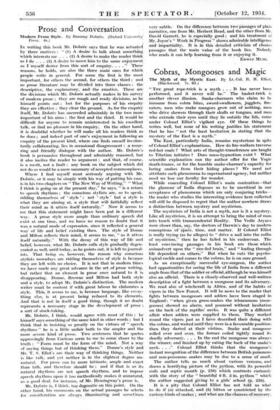Prose and Conersation
IN writing this book Mr. Dobree says that he was actuated by three motives : "(1) A desire to talk about something which interests me . . . (2) A desire to make the reader think as I do . . . (3) A desire to move him to the same enjoyment as I-myself derive from this sort of enquiry. . . . " These reasons, he holds, are also the three main ones for which people write in general. For some the first is the most important, for others the second, for others the 'third ; and so .prose literature may be divided into three classes : the descriptive, the explanatory,' and the emotive. These are the divisions which Mr. Dobree actually makes in his survey of modern prose ; they are rough and ready divisions, as he himself points out ; but for the purposes of his enquiry they are effective : - they clear the ground. As for the enquiry itself, Mr. Dobree has succeeded admirably in the two more important of his aims : the first and the third: It would be difficult for anyone to remain uninterested in his excellent talk, or find no pleasure in his enquiry. On the other hand, it is doubtful whether he will make all his readers think, as he does ; and indeed part of one's enjoyment in following an enquiry of the present kind, where one finds oneself involun- tarily collaborating, lies in occasional disagreement : a recur- ring and friendly dialogue with the author. Mr. Dobree's book is persuasive throughout and admirably reasoned, but it also incites the reader to argument ; and that, of course. is a merit, not a fault : any book on the subject which did not do so would be a mere summary of accepted commonplaces.
Where I find myself most seriously arguing -With Mr Dobree, or it may be simply with his way of putting his case, is in his two chapters on "The New Way of Writing." "What I think is going on at the present day," he says, "is a return to speech rhythms ; the conscious stylists are, so to speak. ridding themselves of 'style' : not 'style' but 'a style is what they arc aiming at, a style that will faithfully reflect their mind as it utters itself naturally." Now it seems to me that this statement might have been put in a different way. A prose style more ample than ordinary speech did exist at one time, and we have no reason to doubt that it was a natural mode of expression, since it reflected a general way\ of life and belief existing then. The style of Donne and Milton reflects their mind, it seems to me, "as it utters itself naturally." With the decay of this way of life and belief, however, what Mr. Dobree calls style gradually degen- erated as well, until today, as he points out, it is left to journal- ists. That being so, however, the reason why conscious stylists nowadays are ridding themselves of style is because they are left with no choice. It is not that in modem tunes we have made any great advance in the art of prose writing, but rather that an element in prose once natural to it is disippearing. Donne, Browne and Milton had both style and a style, to adopt Mr. Dobree's distinction. The modern writer must be content if with great labour he elaborates a style. This, it seems to me, is because language, like every- thing else, is at present being reduced, to its elements. And that is not in itself a good thing, though it no doubt represents a necessary stage in the development of prose : a sort of stock-taking.
Mr. Dobree, I think, would agree with most of this ; he hiriaself says something of the same kind in other words ; but I think that in insisting so greatly on the virtues of "speech rhythms" he is a little unfair both to the ampler and the more severe kind of prose. Two sentences that he quotes approvingly from Cocteau semi' to me to come closer to the truth "Form must be the form of the mind. Not a way of saying things but of thinking them." Donne's style and Mr. T. S. Eliot's are their way of thinking things. Neither, is like talk, and yet neither is in the slightest degree un- natural. For prose can be more intimate, ample and exact than talk, and therefore should be ; and if that is so its natural rhythms are not speech rhythms, and to impose .speech rhythms upon it too methodically makes it unnatural, as a good deal, for instance, of Mr. Hemingway's prose is.
Mr. Dobree is, I think, too dogmatic on this point. Ott the other hand, his comments on the- actual passages he selects for consideration are always illuminating and sometimes very subtle. - On the difference-betiveen twcip-assages of plain narrative, one from Mr. Herbert Read, and the other from Mr. David Garnett, he is especially. good ; and his treatment of Mr. Joyce's" Work in Progress'" shims admirable intelligence and impartiality. It is in this detailed criticism of choien passages that the main value of the book lies. Nobody who reads it can help learning from it or enjoying it.
EDWIN Mum.














































 Previous page
Previous page